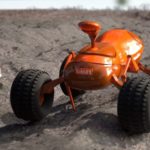 Agriculture has been undoubtedly one of the most fascinating sectors for the deployment of new technology, with drones, robotics and AI all receiving ample experimentation. British retailer the John Lewis Partnership have been one of the more enthusiastic adopters, with the Ocado online supermarket they formed back in 2000 one of the pioneers of automation.
Agriculture has been undoubtedly one of the most fascinating sectors for the deployment of new technology, with drones, robotics and AI all receiving ample experimentation. British retailer the John Lewis Partnership have been one of the more enthusiastic adopters, with the Ocado online supermarket they formed back in 2000 one of the pioneers of automation.
Ocado may have been sold off by John Lewis a few years ago, but the spirit of innovation remains, as evidenced by a recent trial partnership undertaken with the Small Robot Company that will see the startups farmbots deployed at a farm in Hampshire.
The trial will involve the robot, which is fitted with an array of cameras to understand the lay of the land and harvest a large quantity of data about the plot it’s prowling. The data collected will then be used to train the machine learning algorithm used by the robot to navigate a range of scenarios, including differentiating between weeds and terrain.
It’s an innovation that the team believe could increase revenues by up to 40%, whilst also lowering costs by as much as 60%. The team are hoping to use the data to develop an AI system that they’re referring to as ‘Wilma’. The system will eventually guide a network of robots on the farm autonomously. These robots will perform weeding and planting tasks with precision and efficiency.
Environmental benefits
The team also believe the robots will provide a number of environmental benefits. They’re considerably lighter than traditional tractors, and therefore cause less damage to the soil than current practices. What’s more, the robots should be able to provide personalized care to each plant, and therefore provide them with just the right amount of nutrients and support, therefore reducing waste.
“We are very excited to trial Tom, Dick and Harry at the Leckford Estate. The Waitrose & Partners farm has a long history in producing a wide variety of high quality crops. We work hard to farm in harmony with the environment and our vision for sustainable farming is aligned to what the Small Robot Company is trying to achieve,” the farmers say.
“This new technology could be revolutionary for British farming. It is not designed to replace human labour but instead boost productivity and increase accuracy, freeing up the agricultural workforce to focus on other important tasks. We want to be at the forefront of this, and ensure we leave our soils and environment in great shape for future generations.”
Suffice to say, despite the hoopla, the trial is at a very early stage and will operate for a few years, so it’s nowhere near operating at any kind of scale yet, but it is nonetheless an interesting example of how new technologies are finding their way into the sector.